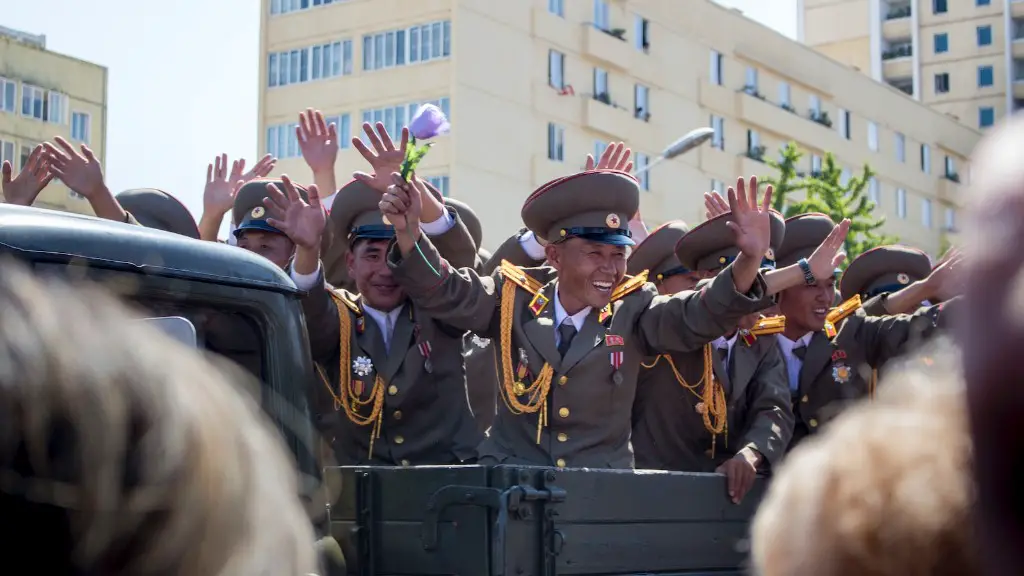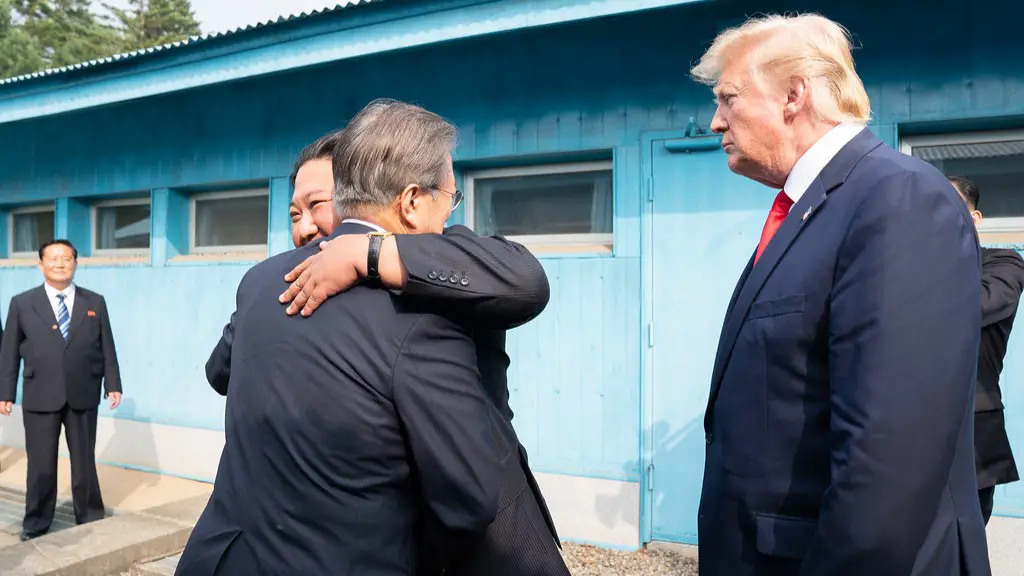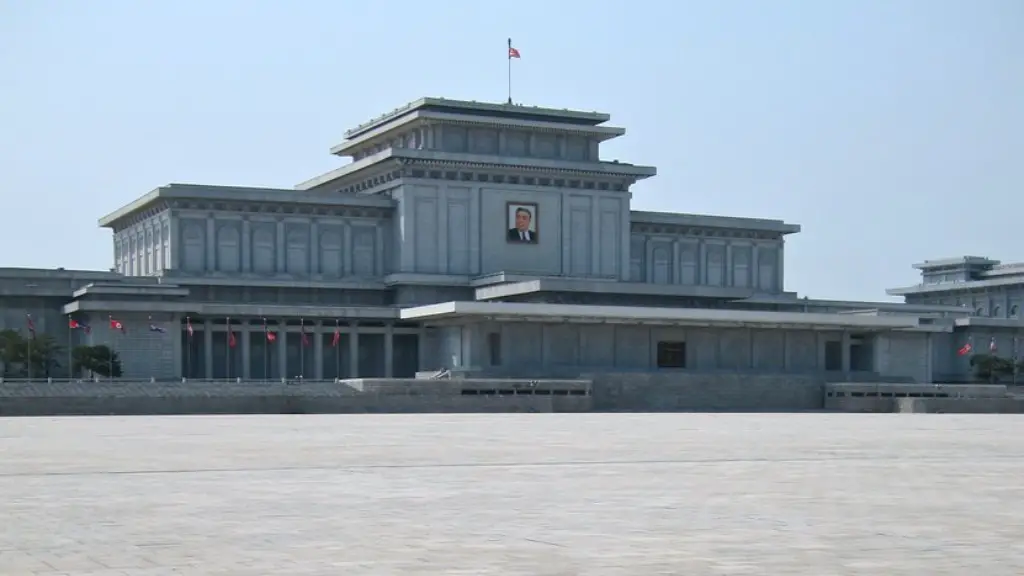The U.S. has escalated its sanctions on North Korea in the last couple of decades due to the country’s nuclear proliferation and other activities. The tension between North Korea and the U.S. has been a constant threat to international security, and both countries have been leveraging diplomatic strategies and economic resources to oppose each other.
The Trump administration has been focusing on a diplomatic strategy called “maximum pressure” in an attempt to rein in North Korea’s nuclear ambitions. This strategy emphasizes joint economic sanctions between the U.S. and its allies and partners, as well as an increased military presence in the region. The U.S. has imposed economic penalties on North Korea, targeting its export and import activities and cutting off access to the global banking system. The U.S. has also been using targeted sanctions, such as prohibiting North Koreans from traveling to America, restricting North Korea’s access to foreign assistance, and imposing trade sanctions on specific North Korean companies and individuals.
The U.S. has also been actively engaging with regional partners to build stronger regional coalitions to counter North Korea’s activities and to garner additional international support for U.S. policies. In particular, it has been working to strengthen its alliance with Japan and South Korea, two countries that are especially vulnerable to North Korean aggression. These countries have been contributing to the “maximum pressure” strategy in the form of economic measures as well as intelligence sharing. Additionally, the U.S. has also been increasing diplomatic efforts to engage with China, the only country that is willing to engage diplomatically with North Korea.
The Trump administration has also taken a number of steps to increase military presence in the region. The U.S. has deployed additional troops to the Korean Peninsula, and is conducting joint military exercises with South Korea and Japan to demonstrate the unity of the countries in opposing North Korea’s pursuit of nuclear weapons and missiles. The U.S. has also bolstered its missile defense system in the region.
Experts have determined that the U.S. is unlikely to achieve its objective of weakening North Korea through economic sanctions alone. Military and diplomatic efforts must be used in conjunction with economic measures in order to bring North Korea to the negotiating table.
The experts also point out that sanctions can backfire if they are too restrictive and create even more tension between the two countries. This is what happened in 2017 when the U.S. imposed a total ban on financial transactions with North Korea. This harsh measure caused Pyongyang to step up its nuclear and missile tests.
The U.S. has argued that its strategy of “maximum pressure” is working as it has managed to derail North Korea’s nuclear and missile programs to some extent. However, some critics argue that it is too early to tell whether this strategy is successful, as North Korea continues to develop its nuclear weapons and its capability to launch them.
North Korea’s Nuclear Program
Over the years, North Korea has consistently pursued a nuclear program which has been a major source of tensions between the U.S. and North Korea. The country has consistently rebuffed U.S. and international pressures to give up its nuclear weapons and has regularly tested nuclear weapons and long-range missiles. In 2017, after 6 months of icnreased tensions, the U.S. and North Korea held talks and agreed to a roadmap to denuclearize the Korean Peninsula. However, a year later, talks have stalled due to disagreement on disarmament steps.
The U.S. has been actively engaged in trying to prevent North Korea from further developing its nuclear program. The U.S. has imposed additional sanctions, including restrictions on oil imports, on countries that do business with North Korea, which has decreased North Korea’s access to resources. The U.S. has also deployed a high-level diplomatic team to Pyongyang to discuss the issue and to persuade North Korea to give up its nuclear weapons.
The U.S. has also tried to engage regional actors in the search for a solution. The Trump administration has been attempting to rally regional support for a unified approach to handling North Korea, in particular by persuading China, North Korea’s main ally, to pressure North Korea to give up its nuclear weapons. The U.S. has also been trying to strengthen the economic and diplomatic ties between South Korea and Japan in an effort to create a united front against the North Korean nuclear threat.
Though the U.S. has taken a number of steps to contain North Korea’s nuclear ambitions, it has been difficult to make progress due to North Korea’s unwillingness to give up its nuclear weapons. The U.S. is still cautiously optimistic that a diplomatic solution to the crisis can be found, and has committed to finding a mutually acceptable solution that will ensure peace and stability in the region.
Sanctions on North Korea
Apart from pursuit of higher level diplomatic talks, the U.S.’s stance towards North Korea has been to enforce economic and financial sanctions on North Korea in order to narrow their nuclear capabilities and prevent nuclear proliferation and illicit activities. This was proposed last year by the Trump administration and is known as the ‘maximum pressure campaign’. The U.S., in particular, has been trying to persuade other world leaders to put sanctions on North Korea, in order to prevent weapons of mass destruction proliferation and put an end to their trade-in missile technology. The sanctions imposed on North Korea by the UN have severely affected the country’s tough economic situation, and this has caused a significant reduction in their military spending and acquisition of wealth.
U.S. officials have argued that the sanctions have been effective in reducing the threat posed by North Korea. Since the sanctions were imposed, North Korea has refrained from nuclear and missile tests. Following the UN Security Council resolution, multiple U.S. and allied countries have continually implemented sanctions, targeting financial institutions and North Korea’s trade and investments. The U.S. has also targeted North Korea’s imports of oil, causing some of North Korea’s vital imports to come to a halt.
Domestically, the U.S. has imposed restrictions on North Korean-Americans. Those North Korean-Americans who want to travel to North Korea must obtain a special license from the State Department. This was done to ensure that money from American citizens does not enter North Korea to support their nuclear weapons programs or other illicit activities.
Experts have argued that sanctions have had an impact on North Korea, but it is difficult to tell if these measures will be enough to bring the regime to the negotiating table. Though the U.S. has been successful in convincing other countries to impose sanctions, they have not been successful in getting North Korea to the negotiating table. The success of the sanctions largely depends on the degree to which they are enforced.
U.S. Military Presence in Region
In addition to economic and financial sanctions, the U.S. has maintained a strong military presence in the region as a form of deterrence against North Korea’s act of aggression. The U.S. has deployed additional troops in South Korea, Japan, and Guam as part of their effort to counter any North Korean threat that could affect the stability of neighbouring countries. The U.S. also conducts joint military exercises with South Korea, in order to demonstrate their unity in taking action against any North Korean aggression.
Furthermore, the U.S. has increased their missile defense system in the region in order to better defend the area against any North Korean missile attacks. In 2017, the U.S. deployed the THAAD anti-missile system in South Korea, in order to intercept any North Korean missiles targeting South Korea or Japan. This system has been used to intercept North Korean ballistic missiles, which have been widely seen as a direct threat to international peace and stability.
Despite the increased military presence and defense capabilities, experts believe that North Korea still holds the advantage when it comes to their nuclear and missile stockpile. The U.S. has yet to find a diplomatic solution that could guarantee the verifiable denuclearization of North Korea, which would render their military effort useless.
Military actions can be seen as a last resort by the U.S., and experts have argued that the U.S. should increase their diplomatic efforts with North Korea in order to find a peaceful solution to the crisis.
U.S. Propaganda Campaign
The U.S. has also launched a propaganda campaign to try to undermine the North Korean regime. The campaign has included broadcasting messages to North Korea via the Voice of America, in addition to leaflets attacking the policies of the North Korean leader Kim Jong-Un. The U.S. also coordinates cyber operations against North Korea to sabotage its missile and nuclear activities. The U.S. believes that such measures can weaken North Korea and make it more willing to negotiate with the U.S. and its allies.
However, some experts have argued that these measures are ineffective and do not improve the situation. They contend that these tactics are just a way for the U.S. to communicate their position to North Korea, and that the North Korean regime is highly unlikely to be swayed by the U.S.’s efforts. Additionally, there are concerns that these operations can be perceived as hostile and escalate tensions further.
Overall, the U.S. has taken a variety of measures to contain North Korea, including economic sanctions, a military presence in the region, and a propaganda campaign. It is unclear how successful these strategies have been in trying to bring North Korea to the negotiating table and to stop the country’s nuclear and missile programs. The U.S. is cautiously optimistic that diplomatic solutions can be reached, but they continue to be prepared for the possibility of military action should diplomatic efforts fail.





